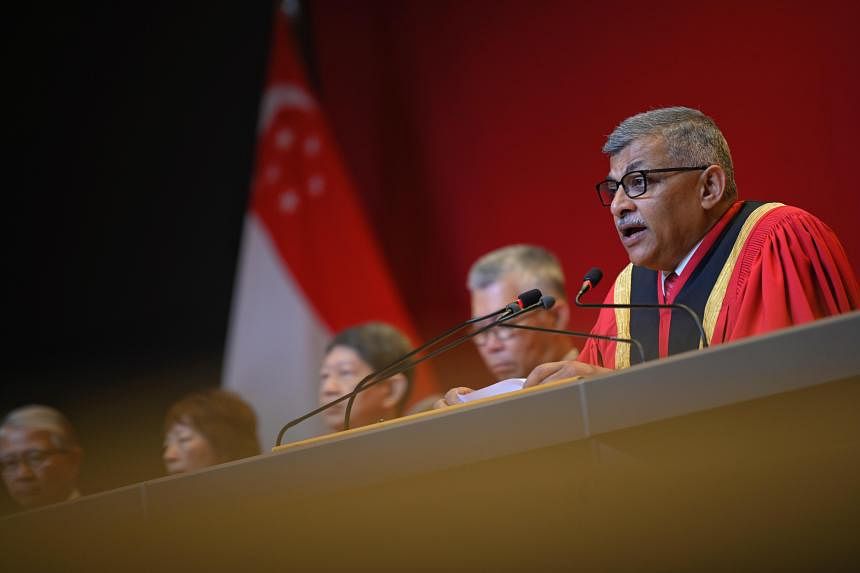Troubling rise in breaches of ethics, professional standards by lawyers: Chief Justice
Chief Justice Sundaresh Menon speaks during the opening of the 2023 legal year at the Supreme Court, on Jan 9, 2023. ST PHOTO: MARK CHEONG
Selina Lum
Senior Law Correspondent
Jan 9, 2023
SINGAPORE – There has been a troubling rise in breaches of ethics and professional standards by lawyers, and the profession must act together to guard against a drop in standards, Chief Justice Sundaresh Menon said on Monday.
Speaking at an annual ceremony to mark the opening of the legal year, the Chief Justice said: “My point is that a looming decline in ethical and professional standards is likely to be exacerbated if we do not actively apply ourselves to fostering the sort of values that must characterise our profession, and a drop in standards cannot, and will not be tolerated.
“We must therefore act together to guard against this.”
The event was held at the Supreme Court auditorium, with about 300 members of the legal community attending in person, after two years of online and hybrid formats.
In his speech, Chief Justice Menon noted the rising number of disciplinary tribunals over the years: 12 were appointed in 2018 to formally investigate complaints against lawyers, 13 in 2019, 16 in 2020, 28 in 2021 and 25 in 2022.
He said it was critical that lawyers remain anchored to the values of honesty, integrity and service, amid the changes affecting the profession.
At least three trends can be discerned from the disciplinary cases, he said.
First, a drop in client care standards. In many cases, lawyers acted contrary to their clients’ instructions, failed to keep their clients reasonably informed of the proceedings, or were disloyal to their clients’ interests.
Second, poor professional standards. Cases included those of lawyers failing to comply with the regulations for running a practice, falsely attesting to the execution of documents, and deliberately breaching a solicitor’s undertaking.
The third trend was a disregard for the court process, most notably in the criminal justice sphere, where counsel sought repeatedly to reopen capital cases on spurious grounds at the eleventh hour.
The Chief Justice said he did not attribute these trends to the shift to working remotely after the onset of the Covid-19 pandemic in 2020.
He said he has asked Justice Valerie Thean and Senior Counsel Jimmy Yim to spearhead a team that will develop a strategy aimed at re-establishing the moral centre and the values of the profession for existing practitioners, and at fostering them among new entrants to the ranks.
The Chief Justice would also like the group to consider the impact of the changes arising from events of the last three years, from the perspective of the professional and ethical well-being of the profession.
He said: “The practice of law is not just a way to earn a living. It is a calling to participate in the administration of justice.”
He said he had occasion to reflect on this when he heard the cases of some aspiring lawyers who had cheated in some papers for Part B of the Bar examinations in 2020.
All 11 candidates who were caught cheating in the exam have been allowed to withdraw their applications to be admitted to the Bar.
“I think we need to emphasise the inescapable truth that being a lawyer entails a choice to live by those values of honesty, integrity and service which transcend our individual careers, cases or examinations,” the Chief Justice said.
He noted that the practice of law has traditionally been learnt by apprenticeship, and its values have been transmitted through sustained mentorship.
This entails watching and listening to one’s mentors and role models. Having spent much of the past three or so years working remotely, there will inevitably be some loss of such opportunities, the Chief Justice said.
“Even with hybrid arrangements, we should not think that mentoring can be put aside just because we are working from home. On the contrary, there must be a conscientious, intentional effort to mentor our juniors and to invest in their developmental growth,” he said.
He also briefly touched on the issue of salary, which was cited as a push factor by some who chose to leave the profession.
He observed that lawyers have traditionally been well compensated, although market forces ultimately determine salaries. Those forces have recently put considerable pressure on salaries at local law firms, and the legal service and the judicial service recently adjusted salaries and their compensation frameworks to narrow the gap, especially for younger officers.
“That said, we should also recognise that those who come to the law because they think it is a road to quick riches will likely find disappointment. Law is a demanding vocation,” said the Chief Justice.
“It takes time, decades in fact, to achieve a higher degree of competence. It is therefore best seen as a calling to be answered with devotion and stamina, rather than as a gig to be experienced.”
In his speech, Law Society president Adrian Tan reported that membership had shrunk for the first time in five years.
Mr Tan said that from 2017 to 2021, the society’s membership grew year on year, reaching a high of 6,333 in 2021. But in 2022, it dropped to 6,273 members.
The loss came from juniors who left the profession after practising for less than five years, he noted.
International studies suggest the decline in lawyer numbers may not be a Singapore problem, said Mr Tan, who revealed that the Law Society has commissioned a study to investigate the reasons behind the decline.


